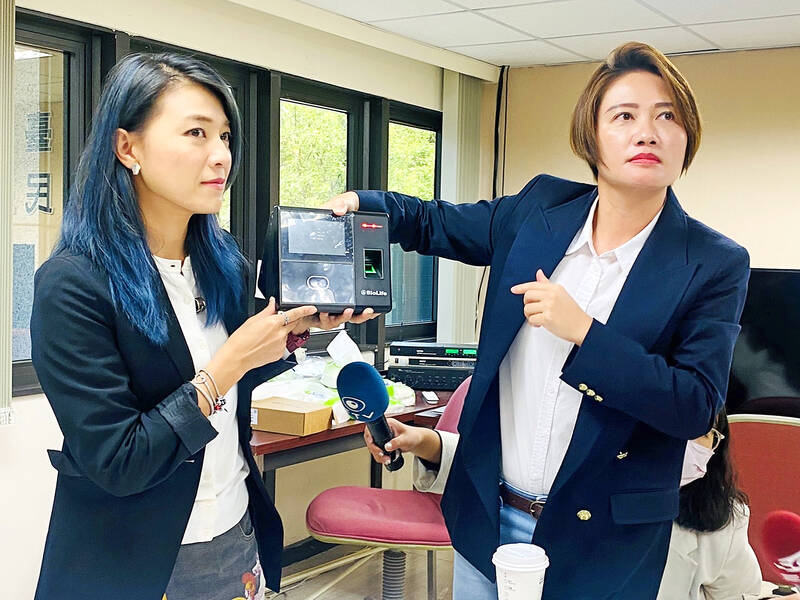The Taipei City Government yesterday vowed to ensure all municipal devices are provided by secure sources, after city councilors alleged that 19 municipal offices used attendance machines which were made or assembled in China and Thailand, and had fingerprint collection and facial recognition capabilities.
Eight agencies procured Chinese-made machines, while 11 agencies bought machines that were assembled in Thailand, but are mainly made of components produced in China, Democratic Progressive Party (DPP) Taipei City Councilor Lin Yen-feng (林延鳳) told a news conference at Taipei City Hall.
The city’s use of those attendance machines is a breach of the cybersecurity guidelines issued by the central government, she said, adding that the Thai machines were on a blacklist on the National Communications Commission’s Web site.

Photo: Yang Hsin-hui, Taipei Times
Forty Taipei City Government offices and agencies bought new biometric attendance machines after the municipality ordered measures to be taken to stop city employees from cheating by having colleagues clock in for them, she added.
Although the municipal government said the machines were connected to the agencies’ internal network and likely did not pose a cybersecurity threat, Lin said she disagreed with this assessment.
The central government’s guidelines had urged public bureaucratic organizations to be cautious when ordering digital products and services, she added.
The failure of the Taipei City Government to follow cybersecurity standards called into question the security of city residents’ personal information in municipal systems, DPP Taipei City Councilor Yen Juo-fang (顏若芳) said.
The city’s procurement process must be reviewed to weed out Chinese-made technology products assembled in a third country and all biometric attendance systems should be checked for their place of origin, Yen said.
A representative of the Taipei Department of Information Technology at the news conference did not dispute the city councilor’s allegations.
The agency would intensify its efforts on supervising city offices’ compliance with regulations, the representative said.
City agencies would submit all procurement plans to the department for evaluation and approval to help avoid the problem, they added.
A representative of the Taipei Public Works Department said the machines might have slipped through the cracks, as the city government did not require subordinate offices to write contracts for small-volume purchases.
The Taipei Department of Information Technology is launching a probe into any potential harm to cybersecurity caused by the attendance machines, department commissioner Chao Shih-lung (趙式隆) said.

The Ministry of Economic Affairs has fined Taobao NT$1.2 million (US$36,912) for advertisements that exceed its approved business scope, requiring the Chinese e-commerce platform to make corrections in the first half of this year or its license may be revoked. Lawmakers have called for stricter enforcement of Chinese e-commerce platforms and measures to prevent China from laundering its goods through Taiwan in response to US President Donald Trump’s heavy tariffs on China. The Legislative Yuan’s Finance Committee met today to discuss policies to prevent China from dumping goods in Taiwan, inviting government agencies to report. Democratic Progressive Party Legislator Kuo Kuo-wen (郭國文) said

The Ministry of Economic Affairs has fined Taobao NT$1.2 million (US$36,900) for advertisements that exceeded its approved business scope and ordered the Chinese e-commerce platform to make corrections in the first half of this year or its license would be revoked. Lawmakers have called for stricter supervision of Chinese e-commerce platforms and more stringent measures to prevent China from laundering its goods through Taiwan as US President Donald Trump’s administration cracks down on origin laundering. The legislature’s Finance Committee yesterday met to discuss policies to prevent China from dumping goods in Taiwan, inviting government agencies to report on the matter. Democratic Progressive Party

Taiwan and its Pacific ally Tuvalu on Tuesday signed two accords aimed at facilitating bilateral cooperation on labor affairs, according to Taiwan’s Ministry of Foreign Affairs (MOFA). The governments inked two agreements in Taipei, witnessed by Foreign Minister Lin Chia-lung (林佳龍) and visiting Deputy Tuvaluan Prime Minister Panapasi Nelesone, MOFA said in a news release. According to MOFA, the agreements will facilitate cooperation on labor issues and allow the two sides to mutually recognize seafarers’ certificates and related training. Taiwan would also continue to collaborate with Tuvalu across various fields to promote economic prosperity as well as the well-being of their

Sung Chien-liang (宋建樑), who led efforts to recall Democratic Progressive Party (DPP) Legislator Lee Kun-cheng (李坤城), was released on bail of NT$80,000 today amid outcry over his decision to wear a Nazi armband to questioning the night before. Sung arrived at the New Taipei District Prosecutors’ Office for questioning in a recall petition forgery case last night wearing a red armband bearing a swastika, carrying a copy of Adolf Hitler’s Mein Kampf and giving a Nazi salute. Sung left the building at 1:15am without the armband and covering the book with his coat. Lee said today that this is a serious